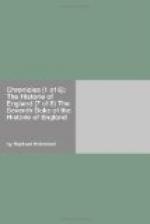London & other great cities & townes submit themselues to Cnute, he hasteth after Edmund with his power, both their armies being readie to incounter by occasion are staied, the oration of a capteine in the hearing of both hosts; the title and right of the realme of England is put to the triall of combat betweene Cnute and Edmund, Cnute is ouermatched, his woords to king Edmund, both kings are pacified and their armies accorded, the realme diuided betwixt Cnute and Edmund, king Edmund traitorouslie slaine, the dissonant report of writers touching the maners of his death, and both the kings dealing about the partition of the realme, Cnute causeth Edrike to be slaine for procuring king Edmunds death, wherein the reward of treason is noted; how long king Edmund reigned, and where he was buried, the eclipsed state of England after his death, and in whose time it recouered some part of its brightnesse.
THE TENTH CHAPTER.
In the meane while that Edmund was busie to leauie a new armie in Glocester, and other parties of Mercia, Cnute hauing got so great a victorie (as before is mentioned) receiued into his obeisance, not onelie the citie of London, but also manie other cities and townes of great name, and shortlie after hasted forward to pursue his enimie king Edmund, who was readie with a mightie host to trie the vttermost chance of battell if they should eftsoones ioine. Heerevpon, both [Sidenote: Polydor.] the armies being readie to giue the onset, the one in sight of the other at a place called Dearehurst, neere to the riuer of Seuerne, by [Sidenote: Matth. West. Simon Dun.] the drift of duke Edrike, who then at length began to shew some token of good meaning, the two kings came to a communication, and in the end concluded an agreement, as some haue written, without anie more adoo. Others write, that when both the armies were at point to [Sidenote: Matth. West. saith this was Edrike.] haue ioined, one of the capteins (but whether he were a Dane or an Englishman, it is not certeinlie told) stood vp in such a place, as he might be heard of both the princes, & boldlie vttered his mind in forme following.
The oration of a capteine in the audience of the English and Danish armie.
“We haue, most woorthie capteins, fought long inough one against another, there hath beene but too much bloud shed betweene both the nations, and the valiancie of the souldiers on both sides is sufficientlie seene by triall, & either of your manhoods likewise, and yet can you beare neither good nor euill fortune. If one of you win the battell, he pursueth him that is ouercome; and if he chance to be vanquished, he resteth not till he haue recouered new strength to fight eftsoones with him that is victor. What should you meane by this your inuincible courage? At what marke shooteth your greedie desire to beare rule, and your excessive thirst to atteine honour? If you fight for a kingdome, diuide it betweene you two, which sometime was sufficient for seuen kings: but if you couet to winne fame and glorious renowme, and for the same are driuen to try the hazard whether ye shall command or obeie, deuise the waie whereby ye may without so great slaughter, and without such pitifull bloudshed of both your guiltlesse peoples, trie whether of you is most woorthie to be preferred.”




